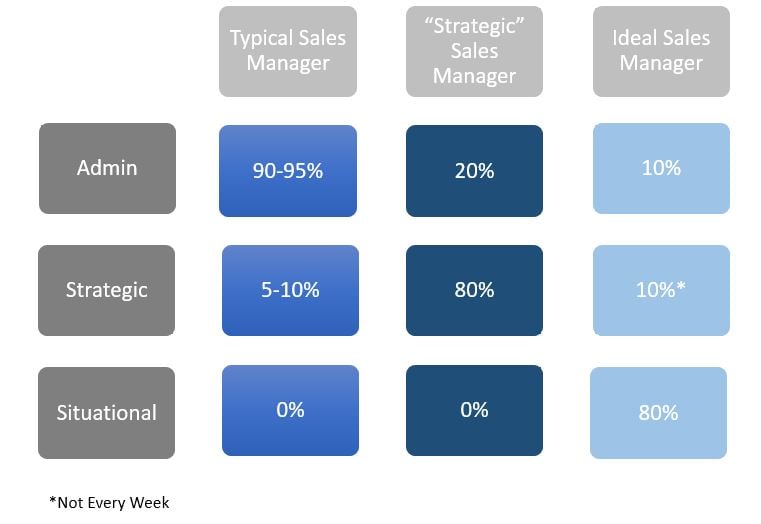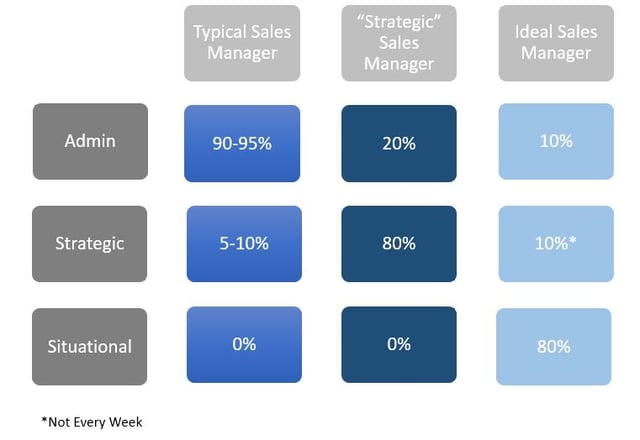Are Your Sales Managers Having the Right Coaching Conversations?
Written by: Mike Carroll

Most sales managers believe they’re already having coaching conversations, but when we dig a little deeper it’s easy to learn that what they consider a “coaching conversation” usually is more focused on updates and administrative tasks than development and growth. The conversations we observe from sales managers tend to fall into three categories:
-
Administrative – reviewing the sales forecast, discussing key performance indicators, checking progress against the plan for the month/quarter/year, updating the forecast, reviewing progress against a specific marketing initiative, discussing the territory plan, making plans for an upcoming trade show, reviewing expense reports or mileage, etc. Typically, this should be about 10% of a coaching conversation – or six minutes during an hour long meeting. It should be a quick discussion to review and confirm information that is already available somewhere else (in the CRM, reviewing calendars, etc.). Too often we see sales managers focusing 95% of their conversation on these types of administrative topics. Certainly you can fill a 60-minute coaching conversation going over these items, but is that the best use of time for two valuable team members?
-
Strategic – identifying new markets to pursue, updating a “top target” list, sharing market intelligence, reviewing pricing strategies, exploring different ways to solve a problem, planning a negotiating strategy, reviewing market coverage statistics, etc. Typically, this should be about 10% of the coaching time, but not every week. These are the types of conversations that should occur once a month or once per quarter where you may devote most of a meeting to a strategic topic. Most sales managers who are focusing 95% of their time on administrative topics will balance the rest of the call with this type of discussion. We’ve observed some managers who love “being strategic” and spend an inordinate amount of time developing “new strategies” to take sales to the next level. But they never stick with anything long enough to execute these strategies and top sales professionals grow tired of the ever-changing directions and simply leave to find a job where they can do what they love to do – sell.
-
Situational Coaching – this is where the rubber hits the road. In our opinion, 80% of a sales manager’s coaching conversation should be focused on what we call situational coaching. This is where learning can occur. What is it? It is taking the time to review a recent call or make plans for an upcoming call and really diagnosing what happened or what needs to happen.
- Looking back at a past call, it’s about reviewing what happened, what could have happened differently, as well as how and why the sales person got to where they ended up. Did they miss an opportunity to ask a question? Why? Were they distracted and not listening? Why? Did they gather the information they needed? Why not? Did they build a stronger relationship? How? What could they have done better? Why didn’t they? And so on. A call review should look at both the underlying issue and the outcome.
- When looking ahead it’s about talking through all the “what if” scenarios. If a sales manager has been doing a good job reviewing past calls, they probably know what patterns to look for and can help the sales person think through how to avoid past pitfalls. The best managers will role play the scenario, first demonstrating the right behavior (here’s how to position it, here’s how to ask this question, here’s how to keep them comfortable with you as you ask tough questions, etc.) then it’s about testing the sales person by having them role play. Share feedback and observations, offer helpful tips, etc.
Here is a chart of the conversations we often see sales managers having during coaching conversations. How many of your sales managers are in the far right column?

For another good article on Sales Management check out Dave Kurlan's post from today, if for no other reason than the great title: Why So Many Sales Managers are So Bad
Related Articles:
Coaching Rhythm and Texting While Driving
My last post talked about the challenges of teaching my middle daughter, who recently got her learners permit, to drive ...
Ready to Build a High-Performing Sales Team?
Let's create your custom Sales Transformation Program.

